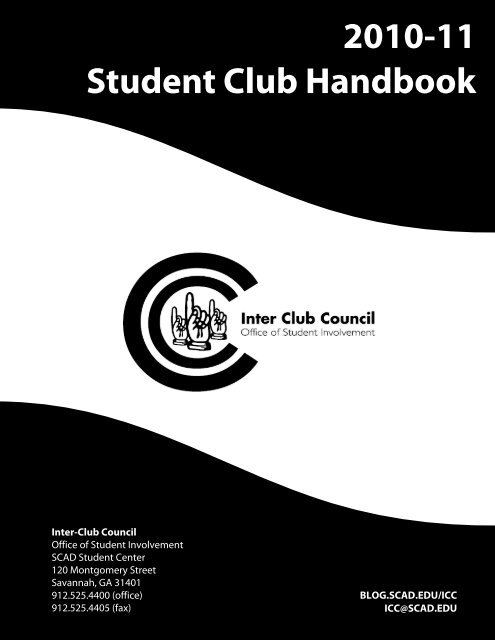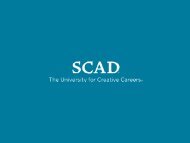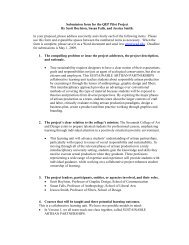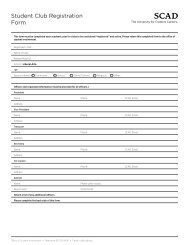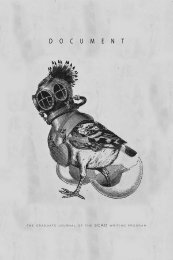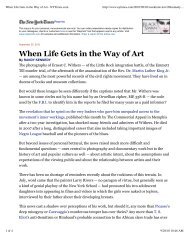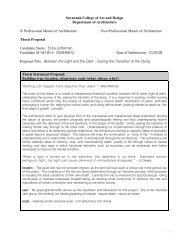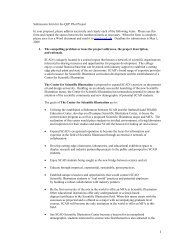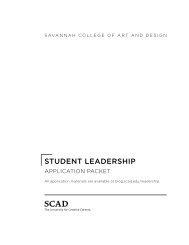2010-11 Student Club Handbook - SCAD Blogs - Savannah College ...
2010-11 Student Club Handbook - SCAD Blogs - Savannah College ...
2010-11 Student Club Handbook - SCAD Blogs - Savannah College ...
You also want an ePaper? Increase the reach of your titles
YUMPU automatically turns print PDFs into web optimized ePapers that Google loves.
<strong>2010</strong>-<strong>11</strong><br />
<strong>Student</strong> <strong>Club</strong> <strong>Handbook</strong><br />
Inter-<strong>Club</strong> Council<br />
Office of <strong>Student</strong> Involvement<br />
<strong>SCAD</strong> <strong>Student</strong> Center<br />
120 Montgomery Street<br />
<strong>Savannah</strong>, GA 31401<br />
912.525.4400 (office)<br />
912.525.4405 (fax)<br />
BLOG.<strong>SCAD</strong>.EDU/ICC<br />
ICC@<strong>SCAD</strong>.EDU
<strong>2010</strong>‐<strong>11</strong> <strong>SCAD</strong> <strong>Student</strong> <strong>Club</strong>s<br />
(As of 07.20.<strong>2010</strong>)<br />
Major and Interest Groups<br />
16 x 9<br />
Ad Cooperative<br />
Africa United Association<br />
American Institute of Architecture<br />
<strong>Student</strong>s (AIAS)<br />
American Institute of Graphic Artists<br />
(AIGA)<br />
Art History Society<br />
Bike <strong>Club</strong><br />
Blacksmithing <strong>Club</strong><br />
Bookbinding <strong>Club</strong><br />
Cartoon Nation<br />
Chinese <strong>Student</strong> Association<br />
Community for Conceptual Development<br />
and Production (CCDP)<br />
Contemporary Animation Society<br />
Digital Fabrication Lab (Fab Lab)<br />
Drumline<br />
Emphasis<br />
Expression Dance <strong>Club</strong><br />
Fashion Buzz<br />
Fashion Haus<br />
Fashion Illustration <strong>Club</strong><br />
Fibers Force<br />
FPS League<br />
Gamers’ Guild<br />
Grad Salon<br />
G2D (Graduate Graphic Design)<br />
Hillel<br />
Industrial Designers of America‐ <strong>Student</strong><br />
Chapter (IDSA)<br />
International Interior Design Association/<br />
American Society of Interior Designers<br />
(IIDA/ASID)<br />
Kamiakze Sushi<br />
Metals and Jewelry <strong>Student</strong> Association<br />
Milaap<br />
MOME Love (Motion Media Design<br />
Group)<br />
NOMAS (National Organization for Minority<br />
Architecture <strong>Student</strong>s)<br />
Professional Audio <strong>Student</strong> Association<br />
(PASO)<br />
Queers and Allies (Q & A)<br />
Reformed University Fellowship<br />
<strong>SCAD</strong> <strong>College</strong> Republicans<br />
<strong>SCAD</strong> Pokemon League: Peach League<br />
<strong>SCAD</strong> SIGGRAPH <strong>Club</strong><br />
Sculpture Forum<br />
Sequential Art Society<br />
Sketch <strong>Club</strong><br />
Society of Collegiate Journalists<br />
Stage and Film Combat <strong>Club</strong><br />
Stop Motion Animation <strong>Club</strong><br />
<strong>Student</strong> Arts Managers<br />
<strong>Student</strong> Outdoor Adventure <strong>Club</strong><br />
<strong>Student</strong> Preservation Association<br />
SWAP (<strong>SCAD</strong> Women of Art and<br />
Perspective)<br />
Tau Sigma Delta<br />
The F in Funny Improve <strong>Club</strong><br />
The Union<br />
Writer’s Circle<br />
Young Activists <strong>Club</strong><br />
<strong>Student</strong> Media<br />
The District<br />
<strong>SCAD</strong> Radio<br />
The District Quarterly<br />
2
<strong>Student</strong> <strong>Club</strong> <strong>Handbook</strong><br />
Table of Contents<br />
Policies for Registered <strong>Student</strong> <strong>Club</strong>s…………………………………………………………………………..6<br />
Starting a New <strong>Club</strong>…………………………………………………………………………………………………….10<br />
Advertising………………………………………………………………………………………………………………….<strong>11</strong><br />
Advisors……………………………………………………………………………………………………………………...12<br />
<strong>Student</strong> <strong>Club</strong> Blog………………………………………………………………………………………………………..13<br />
<strong>Club</strong> Finances and Budget…………………………………………………………………………………………...22<br />
Community Service……………………………………………………………………………………………………..23<br />
Fundraising………………………………………………………………………………………………………………....24<br />
Grants……………………………………………………………………………………………………………………….…25<br />
Dean’s Catering Fund…………………………………………………………………………………………………..27<br />
<strong>Club</strong> Logos and Using the <strong>SCAD</strong> Logo…………………………………………………………………………..28<br />
Monthly Reports………………………………………………………………………………………………………....29<br />
Reserving Space…………………………………………………………………………………………………………..30<br />
Exhibitions……………………………………………………………………………………………………………….….32<br />
Off‐Campus Trips…………………………………………………………………………………………………….…..33<br />
Appendix<br />
Additional Resources<br />
• <strong>Student</strong> <strong>Club</strong> Classifications…………………………………………………………………………………..37<br />
• Sample <strong>Student</strong> <strong>Club</strong> Constitution ………………………………………………………………………..39<br />
• Officer Transition Guide…………………………………………………………………………………………44<br />
• ICC Checkpoints………………………………………………………………………………………….………….46<br />
<strong>Student</strong> <strong>Club</strong> Forms<br />
• New <strong>Club</strong> Interest Sheet<br />
• <strong>Student</strong> <strong>Club</strong> Registration Form<br />
• <strong>Student</strong> <strong>Club</strong> Monthly Report<br />
• Budget Allocation Cover Sheet<br />
• <strong>Student</strong> <strong>Club</strong> Purchase and Reimbursement Request<br />
• <strong>Student</strong> <strong>Club</strong> Deposit Form<br />
• <strong>Student</strong> <strong>Club</strong> Event Request Form<br />
• <strong>Student</strong> <strong>Club</strong> Meeting Room Reservation Form<br />
• ICC Grant Application<br />
• Dean’s Catering Fund Request Form<br />
• <strong>Student</strong> <strong>Club</strong> Off‐Campus Trip Form<br />
• Liability Waiver<br />
• Exhibition Request Form<br />
4
Policies for Registered <strong>Student</strong> <strong>Club</strong>s<br />
Updated July <strong>2010</strong><br />
Each club and advisor is responsible for reviewing and understanding the information in the<br />
<strong>Student</strong> <strong>Club</strong> <strong>Handbook</strong>. This resource addresses many questions that student clubs have and<br />
should be consulted when planning events. If you have questions that are not addressed in<br />
this handbook, please email icc@scad.edu. This resource can also be found online at<br />
blog.scad.edu/icc.<br />
1. Policies:<br />
A. The purpose(s) and activities of the student club must be compatible with <strong>SCAD</strong>’s<br />
mission statement.<br />
B. Only student clubs recognized by the <strong>College</strong> are permitted to use the name and<br />
facilities of <strong>SCAD</strong> with the approval of the ICC Advisor.<br />
C. The goals and functions of the student club must follow college policies and local,<br />
state and federal laws.<br />
D. The student club will not be recognized by the <strong>College</strong> if its purpose contains any<br />
statement requiring discrimination based on race, sex, religion, sexual orientation<br />
or national origin.<br />
E. All registered student clubs are approved to have an official <strong>SCAD</strong> Blog that may be<br />
obtained by contacting icc@scad.edu. It is the responsibility of the club’s advisor<br />
and executive board to ensure that there are no inappropriate postings or links on<br />
the club’s blog.<br />
F. If inappropriate postings or links are found on a club’s site, the site can be taken<br />
down and the club may be placed on probation.<br />
G. All registered student clubs are approved to have access to a club email account,<br />
which must be requested through icc@scad.edu.<br />
2. <strong>Student</strong> clubs must do the following to remain active:<br />
A. Register with the office of student involvement each academic year.<br />
B. Send one representative to each ICC meeting.<br />
C. Meet on campus at least three times per quarter.<br />
D. Reserve space for activities and programs with the ICC Advisor at least two weeks<br />
in advance of the function.<br />
E. Have an advisor who is a member of the faculty or staff of the <strong>College</strong>. An advisor<br />
must be present at all events. If the assigned advisor cannot be present, the club<br />
may have another <strong>SCAD</strong> faculty or staff member present.<br />
F. Submit a monthly report to icc@scad.edu at the end of each month.<br />
6
G. Use their <strong>SCAD</strong> email account for all email correspondence related to the club’s<br />
business.<br />
H. Secure permission to post, distribute or advertise and visual and/or audio manner<br />
on campus prior to distribution of any handbills, posters or other printed materials,<br />
or engaging in any advertising on campus.<br />
I. Meet deadlines set by the ICC.<br />
J. Turn in all monies raised to the ICC Advisor within five days of receipt.<br />
K. Send club members, including the president or special designee and treasurer to<br />
the annual LEAD conference. Attendance is strongly encouraged for all club officers<br />
and members.<br />
L. Provide the ICC Advisor and the office of student involvement with any amendment<br />
to their constitution and an updated version of their constitution as soon as an<br />
amendment is made.<br />
M. Provide the ICC Advisor and the office of student involvement with any changes<br />
made to the executive board, including the advisor, as soon as the change is made.<br />
3. <strong>Student</strong> clubs may not:<br />
A. Form without approval from the office of student involvement.<br />
B. Hold official functions off <strong>SCAD</strong> property.<br />
C. Charge dues.<br />
D. Have a website that is maintained outside of the <strong>SCAD</strong> server.<br />
4. Failure to comply with the policies will result in an club’s loss of ability to:<br />
A. Use campus facilities<br />
B. Fundraise<br />
C. Have access to club’s bank accounts<br />
D. Apply for school‐funded grants<br />
E. Apply for ICC Budget Allocations<br />
F. Register for the following academic year<br />
5. The charters of a student club may be revoked and/or individual members may be subjected<br />
to disciplinary actions as stipulated in the student handbook if the group or club is<br />
found responsible for violations of the Code of <strong>Student</strong> Conduct, including, but not limited<br />
to the following:<br />
A. Conducting hazing. The term “hazing” means any act that endangers the mental or<br />
physical health or safety of a student, or which destroys or removes public or private<br />
property, for the purpose of initiation, admission into, affiliation with, or as a<br />
condition for continued membership in, a group or club.<br />
B. Displaying disruptive behavior.<br />
C. Holding official functions where alcohol is present.<br />
7
E. Interfering with the orderly academic processes of the <strong>College</strong>, its activities or the<br />
rights and freedoms of other members of the college community.<br />
F. Violating of published <strong>SCAD</strong> rules, regulations or policies.<br />
G. Violating of federal, state or local laws.<br />
H. The <strong>College</strong> prohibits the unlawful possession, use, manufacture, distribution or<br />
dispensing of alcohol or controlled substances by students or employees in college<br />
buildings, on grounds or property or as part of any college activity.<br />
I. Participating in activities which disrupt or obstruct any teaching, research, administration,<br />
disciplinary, public service or other activity authorized to be held or conducted<br />
on <strong>SCAD</strong> premises or at <strong>SCAD</strong> sponsored events.<br />
6. Leadership position requirements<br />
A minimum cumulative grade point average of 2.0 and current enrollment is required for a<br />
student to hold and maintain club offices such as: president, vice president, secretary, treasurer<br />
or comparable positions under other titles. It is the responsibility of the club’s faculty or<br />
staff advisor to ensure compliance with the provision.<br />
7. Financial Guidelines<br />
All groups have two financial accounts in the office of student involvement and are not permitted<br />
to hold any other bank account. Each club gets an account for fundraised monies and<br />
college‐allocated monies. The fundraising account is available to deposit any money raised<br />
through fundraisers or donations. The college‐allocated account is for college‐related grants<br />
and quarterly budget allocations the club receives. In addition, you are able to withdraw funds<br />
for reimbursement of club related expenses from these accounts.<br />
Only the president, treasurer and advisor for each club are allowed to deposit money and control<br />
reimbursements. You are welcome to check the balance of your accounts at any time by<br />
visiting the office of student involvement; however, each club is responsible for tracking their<br />
own budget.<br />
Spending and Reimbursements<br />
A. Funds may be withdrawn from the account as long as a receipt or invoice accompanies<br />
the request. Copies of the receipts, invoices and checks are kept on file if officers<br />
or advisors have questions regarding previous withdrawals. Receipts must be<br />
turned in no later than five business days after purchase.<br />
B. Checks will be available for pick‐up every Tuesday by 5pm in the office of student<br />
involvement.<br />
C. Deposits from fundraisers or donations to the club must be turned in to the office<br />
of student involvement no later than five days after the event or donation is made<br />
to a club. Failure to do so can result in funds being withheld from the club.<br />
8
D. No student club is permitted to have a checking account outside the <strong>SCAD</strong> student<br />
club account.<br />
E. In order to remain in financial good standing, clubs must have a representative at<br />
all ICC meetings.<br />
F. No student club is permitted to charge mandatory dues for participation, as membership<br />
is open to all students regardless of one’s financial ability. <strong>Student</strong>s are allowed<br />
to donate money to the student club of their choice.<br />
G. If the club fails to register with the office of student involvement for two consecutive<br />
academic years, that club will jeopardize their funding and will be considered<br />
inactive. The money in the accounts will be deposited into the student club operational<br />
account.<br />
Fundraising<br />
A. All fundraising activities must be approved by the student club advisor and the ICC<br />
Advisor.<br />
B. <strong>Club</strong>s raising funds by providing food must provide pre‐cooked or pre‐packaged<br />
food or have a professional caterer on site to prepare the food.<br />
C. <strong>Club</strong>s that solicit sponsorships from outside (non‐<strong>SCAD</strong>) organizations or businesses<br />
must contact the <strong>SCAD</strong> Institutional Advancement office and ICC Advisor before<br />
requesting sponsorship.<br />
ICC Budget Allocation Process:<br />
In addition to fundraising, clubs may apply for funds through the Budget Allocation<br />
Process. This process occurs twice each year and the amount awarded to each club var<br />
ies. When completing your proposal, please include the information that is below:<br />
A. Completely fill out the budget allocations form and include all contact information.<br />
B. Consult members of the club and the club advisor to identify all budgetary needs<br />
for the period specified by the ICC.<br />
C. Submit written proposals to the student involvement office no later than the deadline<br />
set by ICC.<br />
D. Follow written proposal guidelines set by ICC during the academic year.<br />
E. ICC will contact the student club by email within five business days if the allocation<br />
is approved.<br />
F. Money awarded for the grant will be transferred to your club’s operational account<br />
within two (2) business days of the notification email being sent.<br />
G. Allocated funds must be spent by the end of the time period set by the ICC Advisor<br />
unless specifically stated otherwise in writing and approved by the ICC Advisor.<br />
H. If funds are not spent on the originally stated purpose or if written authorization is<br />
not received before the end of the set period, allocated funds will be withdrawn,<br />
suspended or the club will be penalized at the discretion of the ICC Advisor.<br />
9
Starting a <strong>Club</strong><br />
<strong>SCAD</strong> has over 60 clubs for students to choose from. These clubs range in focus from academic<br />
to social interests. If a club that meets your specific needs or interests does not exist, it is easy<br />
to start one of your own. Simply follow these five steps:<br />
1. Have 10 other interested students and turn in a New <strong>Student</strong> <strong>Club</strong> Interest Form.<br />
Potential clubs may hold an interest meeting and hang flyers, but these must be approved<br />
through office of student involvement.<br />
2. Read and agree to the <strong>SCAD</strong> student club policies.<br />
3. Elect officers and find a <strong>SCAD</strong> Faculty/Staff advisor. Complete the <strong>Club</strong> Registration<br />
Form for the current academic year.<br />
4. Create a club constitution. You can use the Sample <strong>Club</strong> Constitution as a guide.<br />
5. Discuss your questions with the ICC Advisor or ICC officers at icc@scad.edu or come<br />
to the office of student involvement.<br />
There are a number of benefits that come from being a recognized student club at <strong>SCAD</strong>.<br />
These benefits are not afforded to non‐recognized clubs or individual students. Some of the<br />
privileges of recognized student clubs include:<br />
• Association with <strong>Savannah</strong> <strong>College</strong> of Art and Design, including the ability to incorporate<br />
the name of the university into the name of the club and the ability to use<br />
university logos and trademarks for organizational needs,<br />
• Free website through the club blogs and a free <strong>SCAD</strong> e‐mail address for the club,<br />
• Access to approval for hanging flyers in <strong>SCAD</strong> buildings,<br />
• Ability to raise money for club activities,<br />
• Access to free banking services from the office of student Involvement,<br />
• Use of university facilities,<br />
• Eligibility to participate in the budget allocation process for student clubs, and<br />
• Resources and support from staff members in the office of student Involvement.<br />
For additional information on club classifications, please refer to the <strong>Student</strong> <strong>Club</strong> Classifications.<br />
10
Advertising<br />
There are many methods to advertise your events and club meetings; however, fliers tend to<br />
be the easiest and most popular method. <strong>Student</strong> clubs have the right to hang fliers in <strong>SCAD</strong><br />
buildings, but are still subject to the Publicity Policy in the student handbook. You can review<br />
the student handbook via My<strong>SCAD</strong>.<br />
Fliers publicizing student club meetings and events may be posted on designated bulletin<br />
boards in academic buildings and residence halls. In <strong>Savannah</strong>, all fliers must be stamped by<br />
the office of student involvement, located in the <strong>Student</strong> Center (120 Montgomery St.), prior<br />
to posting or they will be removed. This includes any handbills or table top advertisements as<br />
well.<br />
Publications created by student clubs should be professionally executed, as they reflect the<br />
image of <strong>SCAD</strong>.<br />
Other ways to advertise<br />
Once your space reservations have been approved, your club can advertise on the <strong>SCAD</strong> master<br />
calendar by having your club faculty/staff advisor email calendar@scad.edu.<br />
If you have other ideas on creative advertising, be sure to talk with ICC and the office of student<br />
involvement first.<br />
<strong>11</strong>
Advisors<br />
<strong>Club</strong> advisors are <strong>SCAD</strong> faculty and staff that serve as the main resource for student clubs. Advisors<br />
should be knowledgeable about the clubs activities and serve as a mentor to the students.<br />
When student clubs have questions or need guidance, the club advisor should be their<br />
first resource. If the advisor is unsure, then clubs should contact ICC.<br />
When asking a <strong>SCAD</strong> faculty or staff member to serve as your club advisor, be sure that he/she<br />
understands and is able to fulfill the responsibilities outlined below.<br />
<strong>Student</strong> <strong>Club</strong> Advisor Responsibilities:<br />
• Attend all scheduled club meetings and events.<br />
• Accompany student clubs on any off‐campus trips.<br />
• Manage and prevent risk in relation to club activities.<br />
• Help club find another <strong>SCAD</strong> employee to attend if you are unavailable.<br />
• Meet with club officers regularly.<br />
• Serve as the first resource for any dispute within the student club.<br />
• Help ensure that the club activities meet the mission/purpose of the club and support<br />
the mission and goals of the <strong>College</strong>.<br />
• Be knowledgeable about the policies and procedures related to student clubs via<br />
ICC and the student handbook.<br />
• Have a copy of the club constitution and ensure that the club follows the policies.<br />
• Provide feedback to club officers and members.<br />
• Serve as a mentor to the club as whole and individual club members.<br />
• Be aware of club projects or events and offer ideas freely.<br />
Any questions that student clubs or advisors have may be directed to icc@scad.edu.<br />
12
<strong>Student</strong> <strong>Club</strong> Blog<br />
This guide will teach you how to use <strong>SCAD</strong>’s WordPress blog to manage your club’s website. If<br />
you have questions, please contact icc@scad.edu.<br />
The first step is to open up your web browser (can be on or off campus, on a Mac, PC,<br />
or Linux, and use Firefox, Internet Explorer, Safari, etc.) and type in blog.scad.edu.<br />
13
You should now see this page. You will have to enter the club’s username and password. Substitute<br />
“ICC” for your club’s name. This is the same name that is used to access your club email.<br />
(In this example, “ICC” is the username and ICC’s website is blog.scad.edu/icc.)<br />
14
You should now be on the administration page. Below are video tutorials made by WordPresstraining.com<br />
that teach you how to use WordPress’ web interface. One important concept to<br />
understand is the difference between a page, a post, and a link.<br />
15
Key Terms:<br />
• Pages are the tabs at the top of your screen. When clicked, they take you to another<br />
screen (or page) in the website.<br />
• Posts are more like announcements. They are shown on the home page and are used to<br />
update users about new events, club meetings, site updates, etc.<br />
• Links are shown on the right in the pastel colored box. When the text is clicked, it takes the<br />
user to a completely different website.<br />
16
The next step is to edit the title of your blog. You will change this to your club’s name.<br />
Now put the times your club meets in the tagline box.<br />
For example: “Meetings: Every Wednesday at 8pm in Montgomery Hall Rm. 223”<br />
17
Adding Text and a Document<br />
It is now time to create a page about your club. Click the “Write” tab in the administration<br />
page for your blog. Next click the “Page” button. Give the page a title of “About”. Now fill in<br />
the necessary information about your club as pictured above (Email, Mission, Goals, Officers).<br />
To add a link to your constitution, click the “Add Media” button at the top of the text box.<br />
18
A new window will pop up. Click the link that says “Try Browser Uploader Instead”.<br />
Browse on your computer to your constitution (probably a word document or a pdf).<br />
Once the file is located, click the “Upload” button. A new window will pop up.<br />
19
Give the document the title of “Constitution”. Now all you have to do is click “Insert into Post”.<br />
There will now be blue text that directly links to your constitution document.<br />
20
Selecting a Theme<br />
The last tweak to your newly set up blog is the theme. This is what changes the look of your<br />
site, including colors, font, and overall layout. All you need to do is simply browse for a theme<br />
that suits your club and click on it. A preview will show up; if you like the theme, click on the<br />
link to make it your theme. Otherwise close the box and find another theme.<br />
21
<strong>Club</strong> Finances and Budget<br />
Every registered student club at <strong>SCAD</strong> has two accounts: Allocated and Fundraising.<br />
The fundraising account holds money raised by the club. These funds stay in the account until<br />
requested by the club. Before fundraising, be sure to talk with your club advisor and ICC.<br />
The allocated account holds money distributed to the club through club grants of the ICC<br />
budget allocation process.<br />
The Inter‐<strong>Club</strong> Council conducts two budget allocations each academic year. The first takes<br />
place in the fall, and the second takes place during the winter quarter. The allocations periods<br />
are spaced evenly throughout the year and the dates are announced well in advance each<br />
year.<br />
Every registered student club is eligible to submit a budget allocation proposal if they have<br />
completed each of the ICC Checkpoints.<br />
Budget allocation proposals are written documents that outline the mission and goals of the<br />
club, the specific budget request, and outline how the activities planned with the funds contribute<br />
to the mission of the club. Any additional requirements will be outlined during ICC<br />
meetings.<br />
The Budget Allocation Committee is comprised of students who are members of registered<br />
student clubs. This committee decides, based on written proposals, how much funding each<br />
club receives. The ICC advisor informs the committee of the total amount of funding to distribute.<br />
If allocated funds are not spent by the next allocation period, they may be taken from club accounts<br />
to be reallocated. This is to ensure that funds given to the student clubs by the <strong>College</strong><br />
are spent and used efficiently.<br />
**Please note: Each club is responsible for tracking their own budget!**<br />
Any questions about the allocation process should be direct to icc@scad.edu.<br />
22
Community Service<br />
Community service is a great way for student clubs to reach out to the <strong>SCAD</strong> and <strong>Savannah</strong><br />
communities. Completing community service as a club can serve as a team builder and shows<br />
that your club is interested in serving others.<br />
While community service is not required of student clubs, it is highly encouraged. <strong>Club</strong>s with a<br />
record of community service can apply for the ICC service grant. Community service hours also<br />
are a benefit when applying for budget allocations, since it shows collaboration with other<br />
clubs, <strong>SCAD</strong> departments, and the <strong>Savannah</strong> Community.<br />
The easiest way for clubs to learn more about service opportunities is to contact Service Opportunities<br />
for <strong>Student</strong>s (sos@scad.edu). SOS exists to provide these opportunities for <strong>SCAD</strong><br />
students. However, clubs can organize their projects as well or work with their academic department.<br />
23
Fundraising<br />
Fundraising is a great way for student clubs to raise money to support their activities. Fully<br />
recognized student clubs all have access to a fundraising account. Funds deposited in this account<br />
remain until the club withdraws the funds.<br />
If you have ideas to hold a fundraising event, please submit a formal written proposal to your<br />
advisor and ICC via icc@scad.edu. There is no specific outline to follow, but your proposal<br />
must explain in detail how you plan to raise money, include the location, and explain how you<br />
intend to use the funds in the future. Please be as detailed as possible.<br />
ICC requires a formal proposal to ensure that your club is operating within ICC policies and<br />
procedures, but also so that we can help your club with the planning process. <strong>Student</strong> clubs<br />
are also required to operate within the policies of the <strong>College</strong> and the City of <strong>Savannah</strong>. ICC<br />
exists to help student clubs with this process.<br />
There are several stipulations that clubs must follow in regards to fundraising. Failure to<br />
comply could result in probation and possibly suspension of the club.<br />
A. All fundraising activities must be approved by the student club advisor and through<br />
the ICC Advisor.<br />
B. <strong>Club</strong>s raising funds by providing food must provide pre‐cooked or pre‐packaged<br />
food or have a professional caterer on site to prepare food being sold.<br />
C. <strong>Club</strong>s that solicit sponsorships or funds from outside (non‐<strong>SCAD</strong>) organizations or<br />
businesses must contact the <strong>SCAD</strong> office of institutional advancement and the ICC<br />
Advisor before requesting sponsorship or donations.<br />
D. Location of the fundraising event must be approved by the student club advisor<br />
and ICC Advisor.<br />
Examples of previous fundraising events:<br />
• Selling donuts and coffee during finals week in academic buildings<br />
• Working with <strong>SCAD</strong> dining services on a bake sale<br />
• Selling bumper stickers or t‐shirts to benefit the club<br />
ICC and the office of student involvement exist to help your club achieve its goals. Please contact<br />
us at icc@scad.edu if you have any questions or need help with the process.<br />
24
Grants<br />
Several grants exist as alternate ways for clubs to receive funding for their events and activities.<br />
Grants are issued through ICC and deposited into a club’s allocated account. Unlike allocated<br />
funds, grants are not removed before the next allocation period.<br />
To be considered for a ICC grant, clubs must complete the ICC Grant Application. Turn in you<br />
completed application form the office of student involvement.<br />
Grants are distributed on a first come, first serve basis. Once the grant money for the allocation<br />
period has been distributed, no more grants will be available until the next allocation period.<br />
There are four types of ICC grants available to clubs.<br />
The ICC Academic Program Grant is available to student clubs and groups currently registered<br />
with the office of student involvement. This academic program should strengthen the student<br />
club’s relationship with the participating academic department as well as its corresponding<br />
clubs. Money awarded can be up to $500.<br />
The ICC Collaboration Grant is available to student clubs and groups currently registered with<br />
the office of student involvement. This grant provides funds to student clubs seeking to collaborate<br />
and create programs and events for the college that foster a community among students,<br />
staff, faculty and administration. The activity should promote programming between<br />
different majors and minors. Money awarded can be up to $200.<br />
The ICC Faculty Involvement Grant is available to student clubs and groups currently registered<br />
with the office of student involvement. This grant provides funding for student clubs<br />
seeking to create a program or event in collaboration with a faculty member or faculty member’s<br />
department. Money awarded can be up to $100.<br />
The ICC Service Grant is available to student clubs and groups currently registered with the<br />
office of student involvement. <strong>Student</strong> clubs applying for this grant need to participate in at<br />
least three service events. Each event must have a minimum of three members representing<br />
the student club. Service hours must be completed by at least five members of the club, filed<br />
with the Service Opportunities for <strong>Student</strong>s office, and take place during the quarter for which<br />
you are applying for the grant. Money awarded can be up to $150.<br />
25
Tips for grant applications:<br />
• Talk with your club advisor about the reason you are applying for a grant. Have<br />
them review your application before submitting the form.<br />
• Be very detailed in your application. Describe what the money will go to and list a<br />
budget. Be sure to state why the request relates to the specific type of grant.<br />
• Read through your request and think about any questions that it does not address.<br />
• Proofread and edit before turning in your application. Make sure that the request is<br />
written neatly or typed and that it organized efficiently.<br />
26
Dean’s Catering Fund<br />
<strong>Student</strong> clubs hoping to plan an event using catering may consider applying for the Dean’s Catering<br />
Fund. This fund, provided by the Dean of <strong>Student</strong>s office, allows clubs to receive a $250<br />
credit towards <strong>SCAD</strong> Catering for their event.<br />
The club’s president, treasurer or advisor should complete the Dean’s Catering Fund Request<br />
Form and return it to the office of student involvement. Once approved, the club will be notified.<br />
Please contact icc@scad.edu with additional questions.<br />
27
<strong>Club</strong> Logos and Using the <strong>SCAD</strong> Logo<br />
Creating a logo for your club can be a good way to establish a brand or identity; however,<br />
there are some issues to consider when creating one for your group.<br />
• Is the logo clear? Can people identify it as symbolizing our club?<br />
• Can it be used equally well on our club blog and on fliers or other advertisements?<br />
• Does it represent your club’s mission and values?<br />
• Does it represent the mission and values of <strong>SCAD</strong>?<br />
If your club is considering using the <strong>SCAD</strong> logo, it is vital that you submit the proposed logo to<br />
the ICC Advisor before using the logo. You can do that by emailing a .jpg file to icc@scad.edu.<br />
28
Monthly Reports<br />
Each club is required to complete a monthly report at the end of each month during the academic<br />
year.<br />
Monthly reports are vital in tracking club activities and reporting club accomplishments. They<br />
are also effective in keeping track of your clubs activities and help in compiling information for<br />
the budget allocation applications.<br />
Monthly report are due by the first Friday of each month to the ICC advisor. Forms can be<br />
downloaded from the ICC blog. Completed forms should be emailed to icc@scad.edu.<br />
29
Reserving Space<br />
One of the privileges of being a recognized student club is the ability to reserve space for<br />
meetings or events on campus. When submitting your space request, please follow these easy<br />
steps.<br />
<strong>Student</strong> clubs typically hold two types of events. The first are recurring (weekly or bi‐weekly)<br />
meetings. The club officers and advisors run these meetings.<br />
The other type of events are classified as one‐time large events. Large events include fundraisers,<br />
lectures, week‐long events (i.e. Preservation Week), movies, dances, field trips or anything<br />
else that is not a regular meeting.<br />
Process for Reserving Space<br />
1. Complete a “<strong>Student</strong> <strong>Club</strong> Meeting Room Reservation” or “<strong>Student</strong> <strong>Club</strong> Event Request”<br />
form located on the ICC blog or in the office of student involvement.<br />
2. Submit your completed form to the office of student involvement.<br />
3. Once submitted, your request will be forwarded to Physical Resources for consideration.<br />
4. You will receive e‐mail confirmation of your reservation from the ICC Advisor once<br />
the space has been approved.<br />
5. Once the space is confirmed, the club’s faculty/staff advisor can communicate with<br />
Physical Resources pertaining to the logistics and set‐up of your event.<br />
*We ask that clubs give our office at least two weeks to determine if your requested space is<br />
available.<br />
Reserving space is one of the most basic tasks clubs must complete; however, it can become a<br />
complicated process. <strong>Club</strong>s can avoid this by following these tips:<br />
1. Submit requests early. Space on campus is limited and is reserved by all departments<br />
at <strong>SCAD</strong>. <strong>Club</strong>s have a better chance of getting the space they request if they<br />
turn in their request the quarter before the meeting/event.<br />
2. Be flexible. <strong>SCAD</strong> is constantly looking to improve its facilities, so space that was<br />
reserve one quarter, may be unavailable the next quarter if the building is being<br />
renovated or the purpose of the space changes. ICC will inform student clubs if we<br />
become aware that a space is no longer available.<br />
3. Have multiple locations and dates as options. The exact date and time you request<br />
may not be available, but we can work together to brainstorm other options.<br />
30
The more options you provide, the easier the process will be.<br />
4. Decide if you are reserving for recurring meetings or a one‐time large event.<br />
There are different forms that must be submitted. Email icc@scad.edu if you have<br />
any questions.<br />
5. Talk with your club advisor about your space needs. They may be able to provide<br />
valuable insight.<br />
Here are some additional things to consider when planning large events.<br />
• Timing: Always consider what else is happening on campus when planning your<br />
event. This can affect the availability of space on campus and resources needed to<br />
help your event. Also consider that the One‐Time Large Event Request form can<br />
take up to two weeks to fully process. You must have a reserved space to properly<br />
plan the event and advertise the event. Space requests for large events should be<br />
turned in at least 2 months before the event.<br />
• Location: According to the policies and procedures, clubs must hold events on campus.<br />
The one exception is if the club is going on a field trip. All off‐campus trips<br />
must be approved by the club advisor and the ICC Advisor. <strong>Club</strong> advisors must go<br />
on the trip with the students and students must fill out liability forms.<br />
• Risk: Any event has some inherent risk. ICC and the office of student involvement<br />
exist to help clubs consider all the types of risk associated with an event and ways<br />
to reduce and eliminate risk in club events.<br />
• Publicity: How are people going to know about your event? Post flyers on campus<br />
can be helpful, specifically if you are targeting student from specific majors. Any<br />
flyers posted on campus by student clubs must be approved by the office of student<br />
involvement.<br />
• Transportation: How are students going to get to your event?<br />
• Food: Serving food can be a great way to get people to attend your event and keep<br />
them happy, but it can get expensive and be messy. Always think if spending your<br />
funds on food is the best use of your club’s funds.<br />
• Audio/Visual Needs: If your event includes some type of presentation, you will<br />
need access to A/V equipment. You can request AV equipment on the space request<br />
form, or ask for a room with a projector.<br />
• Personnel: Who from your club is helping to accomplish the tasks needed before<br />
the event? Who will be on site the day of the event? One of the most difficult aspects<br />
of serving as a club officer is delegating responsibility, however delegation is<br />
crucial in successfully organizing a large event.<br />
Questions about space reservations should be directed to icc@scad.edu.<br />
31
Exhibitions<br />
<strong>Student</strong> clubs interested in hosting a exhibition of art work in any <strong>SCAD</strong> facility will need to<br />
work directly with the Exhibitions department here at <strong>SCAD</strong>. <strong>Club</strong> officers should work with<br />
their advisor to facilitate this process. He or she should complete the Exhibition Request Form<br />
and return it to the following location:<br />
<strong>SCAD</strong> Exhibition Department<br />
Attn: Curator<br />
Evans Hall<br />
212 W. Hall Street<br />
<strong>Savannah</strong>, GA 31401<br />
912‐525‐4727 (office)<br />
912‐525‐4952 (fax)<br />
32
Off‐Campus Trips<br />
Sanctioned “off‐campus trips” are planned excursions that are related to academic courses,<br />
athletic team activities and/or field trips that take place away from the <strong>SCAD</strong> campus, thereby<br />
requiring students to travel away from campus to attend the trip. In an effort to make every<br />
off‐campus trip sponsored and funded by a student club and <strong>SCAD</strong> a safe and rewarding experience,<br />
the following guidelines have been established and should be followed when planning<br />
your trip.<br />
1. All trips must be registered with the office of student involvement, in advance of<br />
departure, by completing the “Off Campus Trip Form” and have your advisor sign at<br />
the bottom.<br />
2. The club’s faculty/staff advisor or other authorized college representative must accompany<br />
the group as a “trip coordinator”. If the advisor cannot attend, then the<br />
representative must be another “authorized representative” (faculty member or<br />
administrator from <strong>SCAD</strong>). A student may not act as the trip coordinator. The student<br />
organizer and the advisor or representative must sign and submit to the office<br />
of student involvement the appropriate paperwork, including the forms listed below,<br />
for all conferences/events attended before gaining approval for the trip.<br />
3. All participants must complete and sign the individual Liability Release and Assumption<br />
of Risk prior to attending the trip.<br />
Instructions for Trip Coordinators:<br />
The guidelines below and applicable forms should be distributed to students no less than ten<br />
days prior to the date of departure to provide ample time for them to be reviewed and completed.<br />
Not all travel forms are required for every type of off‐campus trip.<br />
1. Off‐Campus Trip Application: Always required to obtain the necessary approval<br />
from the Office of <strong>Student</strong> Involvement. This form must be completed by the appropriate<br />
Trip Coordinator (Faculty/Staff Advisor). This form may be used for either<br />
on‐going or one‐time trip authorization. It must be completed in its entirety and<br />
submitted to the Office of <strong>Student</strong> Involvement at least ten days prior to departure.<br />
The special instruction area should include an itinerary of the trip. If approved, the<br />
trip coordinator will be notified and a copy will be filed with the Liability Release<br />
and Assumption of Risk forms.<br />
2. Liability Release and Assumption of Risk Form: Always required. Each student must<br />
33
complete this form and return it to the trip coordinator no less than three days<br />
prior to departure. Any student who does not complete and return this form will<br />
not be allowed to attend the trip. This form must be kept on file for two years following<br />
the last day of travel.<br />
3. Emergency Medical Information Form: In addition to the forms required above, this<br />
form is required for off‐campus trips that are off‐campus overnight trips. Each student<br />
must complete this form and return it to the trip coordinator no less than<br />
three days prior to departure. Any student who does not complete and return this<br />
form will not be allowed to attend the trip. This form must be kept on file for two<br />
years following the last day of travel.<br />
The trip coordinator should keep copies of these forms to take on the trip and submit the<br />
originals to the office of student involvement three days prior to the date of departure.<br />
<strong>Student</strong>s‐to‐Staff Ratio<br />
While each trip travels to unique settings, there are general guidelines for student to staff ratio<br />
on any <strong>SCAD</strong> sponsored trip. The first guideline that trip coordinators should follow is that<br />
the number of participants with staff to student ratio should fall within a reasonable range.<br />
1. Off‐campus trips that are overnight should maintain one staff member to every ten<br />
students (1:10).<br />
2. Off‐campus trips that are not overnight (one‐day travel and return trips) one staff<br />
member to fifteen students (1:15).<br />
<strong>Student</strong> Transportation<br />
<strong>SCAD</strong> does not provide liability coverage or student accident insurance for students transporting<br />
themselves to and from an off‐campus trips. <strong>Student</strong>s are highly encouraged to obtain<br />
their own medical insurance. In the event a student travels in any personally‐owned vehicle or<br />
via public transportation for a sanctioned off‐campus trip, the student will be responsible for<br />
any injuries or damages incurred during this trip. The Liability Release and Assumption of Risk<br />
Form must be completed each time a student elects to provide his/her own transportation.<br />
When a student provides his/her own transportation or carpools to an off‐campus trip in personally‐owned<br />
vehicles, the insurance of the car owner is the only insurance in effect. In the<br />
event a student is involved in an accident in his/her personal vehicle while traveling to/from a<br />
<strong>SCAD</strong>‐sponsored event, the student is responsible for loss or damage to the vehicle and any<br />
bodily injury or property damage to others they may cause, and is expected to maintain appropriate<br />
insurance covering damage, liability and medical costs. <strong>SCAD</strong> claims no responsibility<br />
for damage cause by or to students providing their own transportation.<br />
Modes of Transportation<br />
If 15‐passenger vans are used, only those faculty/staff members registered with and approved<br />
34
y <strong>SCAD</strong> Physical Resources are permitted drive. There are NO exceptions to this policy. A 15‐<br />
passenger van should never have more than ten riders. The riders should sit toward the front<br />
and seat belts must be used. Under no circumstances shall students drive these vehicles.<br />
Air travel is permitted, but not required, for trips greater than an eight‐hour drive. All air travel<br />
must be arranged through <strong>SCAD</strong> Travel. As much advance notice as possible is requested. It is<br />
the responsibility of the trip coordinator to make sure the appropriate arrangements have<br />
been made and to verify arrangements prior to departure.<br />
The cost of all travel (<strong>SCAD</strong> transportation, van rentals, charter buses, air, lodging etc.) will be<br />
paid via the student club or club’s operational budget.<br />
Liability Forms<br />
Liability forms will be kept on file for two years. They will be stored in the following way event,<br />
date and alphabetically by last name. They will be kept on file with the office of student involvement.<br />
Outdoor Events and Rain Calls<br />
Rain calls should be discussed no later than two hours before event start time so that all vendors<br />
and participants can be notified.<br />
If it begins to rain during an event all professional and student staff must remain until participants<br />
and vendors (if any) have vacated the event premises. If transportation is used the number<br />
should be kept on hand in order to call for return transportation. If the event is not held at<br />
a <strong>SCAD</strong> site it is best for the transportation to remain on site until the return trip. If the off site<br />
location is in town, transportation does not need to remain on site.<br />
35
Appendix<br />
Additional Resources<br />
• <strong>Student</strong> <strong>Club</strong> Classifications<br />
• Sample <strong>Student</strong> <strong>Club</strong> Constitution<br />
• Officer Transition Guide<br />
• ICC Checkpoints<br />
<strong>Student</strong> <strong>Club</strong> Forms<br />
• New <strong>Club</strong> Interest Sheet<br />
• <strong>Club</strong> Registration Form<br />
• <strong>Student</strong> <strong>Club</strong> Monthly Request<br />
• Budget Allocation Cover Sheet<br />
• <strong>Student</strong> <strong>Club</strong> Purchase and Reimbursement Request<br />
• <strong>Student</strong> <strong>Club</strong> Deposit Form<br />
• <strong>Student</strong> <strong>Club</strong> Event Request Form<br />
• <strong>Student</strong> <strong>Club</strong> Meeting Room Reservation Form<br />
• ICC Grant Application<br />
• Dean’s Catering Fund Request Form<br />
• <strong>Student</strong> <strong>Club</strong> Off‐Campus Trip Form<br />
• Liability Waiver<br />
• Exhibition Request Form<br />
36
<strong>Student</strong> <strong>Club</strong> Classifications<br />
ICC has three types of club classifications. Each classification has certain requirements and<br />
privileges. The classification does not relate to the overall quality of the club, it reflects the<br />
mission and purpose of the club.<br />
The classifications play an important role in the budget allocation process. If you have questions<br />
about your club’s classification, please email icc@scad.edu.<br />
Registered <strong>Club</strong><br />
Requirements<br />
• Current registration form on file with ICC<br />
• Faculty/staff advisor<br />
• Constitution updated and on file with ICC<br />
• Meetings scheduled and space reserved<br />
• Updated blog<br />
Privileges<br />
• Reserve space in <strong>SCAD</strong> buildings and hang flyers<br />
• Receive start up funds<br />
• NOT eligible to participate in budget allocation process<br />
Affiliated <strong>Club</strong><br />
Requirements<br />
• All requirements of Registered <strong>Club</strong><br />
• Create a transition plan and timeline to elect new officers<br />
• Participate in Fall Fest and any additional club info fairs<br />
• Attend officer and treasurer training (once per year)<br />
Privileges<br />
• All privileges of Registered <strong>Club</strong><br />
• Eligible to participate in budget allocation process and request up to $800<br />
• Guaranteed funds each year (amount not yet set)<br />
• Eligible to apply for ICC Grants<br />
• 50 Free copies per month in office of student involvement<br />
37
Professional <strong>Club</strong><br />
Requirements<br />
• All requirements of Affiliated <strong>Club</strong><br />
• <strong>Club</strong> Mission has a career‐based focus<br />
• Completes Two of the Three:<br />
• Plan college wide events / Attends national conferences / national organization affiliation<br />
Privileges<br />
• All privileges of Affiliated <strong>Club</strong><br />
• Eligible to participate in budget allocation process and request up to $5,000<br />
• Guaranteed professional development funds each year (amount not yet set)<br />
38
Sample <strong>Student</strong> <strong>Club</strong> Constitution<br />
Constitution of the<br />
<strong>Savannah</strong> <strong>College</strong> of Art and Design<br />
[Insert <strong>Club</strong> Name Here]<br />
Article I – Name<br />
The name [<strong>Club</strong> Name] has been designated for this student club of <strong>Savannah</strong> <strong>College</strong> of Art<br />
and Design and may, for convenience, be referred to as [Abbreviated or Full <strong>Club</strong> Name] .<br />
Article II – Purpose<br />
Section 1.<br />
[<strong>Club</strong> Name] exists for the purpose of<br />
Section 2.<br />
The objectives of [<strong>Club</strong> Name] shall be:<br />
A.<br />
B.<br />
C.<br />
Article III – Membership and Expectations<br />
Section 1. General Membership<br />
A. All students who are currently enrolled in good standing at the <strong>Savannah</strong> <strong>College</strong> of<br />
Art and Design are eligible to be members.<br />
B. All members are expected to follow all <strong>SCAD</strong> policies and procedures.<br />
39
C. No person shall be denied membership on the grounds of race, religion, creed,<br />
gender, national origin, disability, age, and sexual orientation, be excluded from<br />
participation, be denied the benefits of, or be subject to discrimination as defined<br />
by the Civil Rights Act of 1964.<br />
Section 2. Voting Members<br />
A. Members eligible for voting must have been present at 75% of meetings for<br />
that quarter.<br />
B. All voting members must be a current student in good standing (full‐time<br />
status, 2.5 GPA cumulative, not on disciplinary, residence hall or academic probation,<br />
etc.)<br />
C. No voting member may have more than one vote.<br />
D. In the event that a voting member cannot attend a meeting an alternate may<br />
not be sent in his/her place.<br />
E. Advisers are not granted voting privileges.<br />
Section 3. Executive Officers<br />
A. The executive board consists of the President, Vice President, Treasurer, Secretary<br />
and ICC Liaison.<br />
B. All members of the executive board must have a minimum of 3.0 cumulative<br />
GPA.<br />
C. Members of the executive board are expected to attend, help organize and administer<br />
regular meetings.<br />
Term of office for all executive members will be one academic year.<br />
Article IV – Officer Responsibilities<br />
Section 1. President<br />
A. Primary official spokesperson for the club.<br />
B. Chair general, executive and special meetings.<br />
C. Prepare an agenda for each meeting in conjunction with the executive board and<br />
adviser.<br />
D. Knowledge of the club’s constitution, bylaws, and procedures.<br />
E. Knowledge of <strong>SCAD</strong> policy and resources with regards to student clubs.<br />
F. Appoint, with the consent of the membership other officers and special committees,<br />
as the President deems necessary.<br />
G. Meet with adviser on a regular basis as deemed necessary.<br />
H. Produce a monthly report in regards to ICC guidelines.<br />
Section 2. Vice President<br />
A. Chair meetings in the absence of the President.<br />
B. Assume all the powers and duties of the President in the absence of the President.<br />
C. Work with the office of student involvement office to maintain contact informa‐<br />
40
tion for the club.<br />
Section 3. Treasurer<br />
A. Prepares, with the Executive Board, an annual budget.<br />
B. Will regulate incoming and outgoing funds.<br />
C. Will keep a ledger of the club’s expenditures.<br />
D. Works with the office of student involvement regarding budget allocations, fundraising<br />
and the safekeeping of funds.<br />
Section 4. Secretary<br />
A. To record and distribute minutes of all general and special meetings in a timely<br />
manner.<br />
B. Complete all necessary paperwork needed by the office of student involvement<br />
by the deadlines assigned.<br />
Article V – Advisor<br />
Section 1. Advisor<br />
A. The advisor shall be a full‐time faculty or staff member.<br />
B. Advisors of a major‐specific student club must have the approval of the Chair of<br />
that School’s department.<br />
Section 2. Advisor responsibilities<br />
A. Serve as a mentor to the club; provide direction regarding the purpose and goals of<br />
the club.<br />
B. Coordinate the training of officers maintaining group continuity, and continue traditions<br />
set forth by the club.<br />
C. Attend all meetings and events, and meet with officers on a regular basis.<br />
D. Serve as a liaison between the club and the office of student involvement.<br />
Make sure that the club is in compliance with <strong>SCAD</strong> and <strong>Student</strong> Involvement policies<br />
and procedures, the student handbook, and the student club handbook.<br />
Article VI – Selection of Officers<br />
Section 1. Election of the Executive Officers<br />
A. Only voting members at the time of elections who have at least 3.0 GPA the previous<br />
quarter, can be elected for an executive office.<br />
B. Elections will be held annually during Spring Quarter.<br />
C. Elected officers shall receive a majority of the votes cast. If more than two people<br />
are nominated, a run‐off shall occur between the two people who receive the most<br />
votes in the first round of voting, if in the first round one person does not receive a<br />
majority of votes cast.<br />
41
Section 2. Terms of Office<br />
A. The elected officers shall assume office immediately following election.<br />
B. The officers shall hold office for one academic year.<br />
Article VII – Meetings<br />
Section 1. Regular meetings<br />
A. The club shall meet at least three times per quarter.<br />
B. The meeting schedule will be made available to all members before the last week<br />
of the preceding quarter.<br />
Section 2. Executive Board meetings<br />
A. Executive board meetings will be held on a regular basis at least once a month.<br />
B. The executive board and the adviser will decide the time and place for these meetings.<br />
Section 3. Attendance<br />
A. Attendance at each meeting is required for all representatives.<br />
Section 4. Quorum<br />
A. A quorum is defined as more voting members present than absent. Excused absences<br />
are not included in the quorum count.<br />
Section 5. Voting Rights<br />
A. Only the voting membership has a vote.<br />
B. Members and executives have equal vote.<br />
C. Advisers have no voting status.<br />
D. In case of a tie a revote will be cast; if a tie still happens the issue can be tabled until<br />
the next meeting for further discussion.<br />
Article VIII – Dismissals and Vacancies<br />
Section 1. Recall of Officers<br />
A. The membership may initiate recall of any officer by two‐thirds of the voting members<br />
present of the club in closed session.<br />
Section 2. Vacancies<br />
A. If a vacancy occurs in office through resignation, recall, non‐enrollment in school or<br />
other reasons such as discipline issues, lack of fulltime status, GPA less than 3.0,<br />
etc. the next highest rank shall assume office. The highest ranking officer will then<br />
set up elections for a new officer at the next regular meeting following the occurrence<br />
of the vacancy.<br />
42
Article IX – Finances<br />
Section 1. Dues<br />
A. There shall be no dues for membership for any student club.<br />
Section 2. Funding<br />
A. The primary source of funding shall be from individual club fundraising.<br />
B. Supplemental sources of funding include yearly budget allocations from the Inter‐<br />
<strong>Club</strong> Council and grants made available through the office of student involvement.<br />
Section 3. Fund Accounts<br />
A. Each student club shall be appropriated individual accounts with the office of student<br />
involvement. Each club shall manage its own finances through the office of<br />
student involvement with the guidance and approval of the coordinator of student<br />
programs.<br />
B. The President, Treasurer and Advisor are the only members of the club allowed to<br />
deposit and allocate reimbursements for each student club.<br />
Article X – Amendment Process<br />
A. Proposed amendments to the constitution must be sent to the voting members of<br />
each club at least one week in advance of the next regular meeting.<br />
B. At the next regular meeting, said proposed amendments to the constitution must<br />
be approved by two‐thirds vote of the members.<br />
Article XI – Adoption and Amending<br />
The constitution of [<strong>Club</strong> Name] was adopted and/or amended on [Month, Day, Year].<br />
President’s Signature:<br />
Vice President’s Signature:<br />
Treasurer’s Signature:<br />
Secretary’s Signature:<br />
Advisor’s Signature:<br />
ICC Advisor’s Signature:<br />
43
Officer Transition Guide<br />
A thorough leadership transition plan is the responsibility of both the outgoing and incoming<br />
officers, and is one of the most important tasks of a student club leader. Effective officer transition<br />
accomplishes many important functions, including:<br />
• Transferring significant organizational knowledge.<br />
• Preventing the club from having to start over each year.<br />
• Giving outgoing leaders a sense of closure.<br />
• Providing opportunities for thorough evaluation of the year’s programs and events.<br />
• Orienting new leaders for the club and increasing their expertise and confidence.<br />
• Building relationships between new student leaders and the club advisor.<br />
The goal of officer transition is to transfer the knowledge and information necessary for new<br />
leaders to thrive well and improve the club. Key topics to be covered with new officers include:<br />
• The club’s constitution and regulations,<br />
• Specific job descriptions and responsibilities,<br />
• Evaluations of past events or projects,<br />
• Resources and contacts for hosting future events or programs,<br />
• Budget information, and<br />
• Timelines for the year.<br />
To be effective, transitions must be interactive and communicative processes between all parties<br />
involved. It is also helpful to have this information in writing to pass down to the new<br />
leadership. It is important to focus on the future of the club through evaluations of the past<br />
year and goal‐setting for the upcoming year. Think about your objectives for the transition<br />
process ‐ instilling comfort and pride with the new leadership position, passing on your expert<br />
knowledge, setting the club up for future success, etc. Establish plans for transition that reflect<br />
those specific objectives.<br />
A final note about officer transition is that it actually occurs year‐round, as you identify emerging<br />
leaders within the club and provide them with opportunities to assume increasing amounts<br />
of responsibility for your programs and events. Empower your members to get more involved<br />
from the beginning, and you will have less work to do when you transition them into officer<br />
positions at the end.<br />
44
TOPICS/ITEMS TO BE INCLUDED IN THE TRANSITION PROCESS<br />
• <strong>Club</strong>’s history and organizational calendar<br />
• Constitution and by‐laws<br />
• Organizational goals and objectives from previous years<br />
• Officer job descriptions, detailed roles, responsibilities, and expectations<br />
• Manuals, evaluations of previous projects and programs<br />
• Previous minutes and reports<br />
• <strong>Club</strong> advisor contact information. New officers should meet with advisor before the<br />
end of the spring quarter.<br />
• Information on departments or student groups that have helped to co‐sponsor<br />
events<br />
• Previous programming paperwork and sample flyers<br />
• Financial records and summary of expenses<br />
• Membership lists, club email and blog passwords<br />
45
<strong>Student</strong> <strong>Club</strong> Budget Allocation Process:<br />
ICC Checkpoints<br />
How organized is your club? To prepare for the Budget Allocation Process, clubs should have<br />
each of the seven checkpoints completed and included in your proposal. If your club does not<br />
have all seven checkpoints addressed, the committee will not consider your proposal.<br />
1. <strong>Club</strong> mission and/or purpose statement.<br />
2. Stated SMART goals for your proposed event or project (SMART ‐ Specific, Measurable,<br />
Attainable, Realistic, Timely).<br />
3. Budget for the year – How you are planning to spend your money for the year.<br />
During winter quarter, you will need to explain how your club spent money during<br />
the first half or the year and what you plan on spending during the second half of<br />
the year.<br />
4. Constitution on file in the office of student involvement.<br />
5. <strong>Club</strong> blog updated with club email address, meeting dates/times/locations, mission,<br />
goals, officers and constitution.<br />
6. Meeting space reserved through icc@scad.edu.<br />
7. Timeline created for electing officers and registering club for the next academic<br />
year. Please use the Officer Transition Guide as a resource.<br />
46


